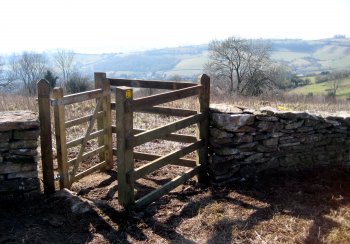
Enforcement Policy
There are over 900km of Public Rights of Way within Bath & North East Somerset made up of public footpaths, public bridleways, restricted byways and byways open to all traffic. The Council is under a statutory duty imposed under section 130 of the Highways Act 1980 to “assert and protect the rights of the public to the use and enjoyment of”, and “prevent so far as possible, the unauthorised stopping up or obstruction of” all these public rights of way.
The aim is to ensure that all public rights of way remain in a condition that is safe and easy for use by the public. The Council carries out practical works to maintain them. When enforcement problems occur, it will use advice, persuasion, direct action and / or prosecution proceedings to resolve them.
To avoid the occurrence of enforcement problems, the Council will give advice, practical assistance and guidance to help landowners and occupiers comply with the law. It will also provide information, education and advice to all those who use or wish to use the public rights of way network in Bath and North East Somerset.
The Council's adopted PROW Enforcement Policy gives an explanation of relevant concepts and background and concludes with a formal statement of Policy.
Courses of Action
There are several possible courses of action available to the Council depending upon the nature of the offence.
1. To Give Advice - Advice may be given when it is considered that the infringement is of a minor nature, and the Council is confident the owner or occupier involved will take the required corrective action. The owner or occupier will be requested to take appropriate remedial action within a given time period depending upon the circumstances of the case.
2. Enforcement Notices - A formal Notice may be served if an offence has been committed and where a request to take remedial action has failed. Such Notice will include provision for the Council to take direct action to remove obstructions or nuisances or to deal with the appropriate restoration of paths and to recover its costs. A Copy of the Notice together with other supporting documentation may also be forwarded to the Rural Payments Agency (RPA) to notify them that a breach of cross-compliance GAEC8 has occurred. This may in turn lead to a whole farm inspection and, where the breach is confirmed, a financial penalty imposed.
3. Caution - A formal Caution may be used where there is evidence of an offence having been committed and the person responsible for the offence has admitted it. They may be used where there is reason to believe that remedial works will be carried out. Where a formal caution is issued the offender will be required to sign the caution. As it entails an admission of guilt by the person responsible, it is used only where prosecution proceedings would otherwise be appropriate. A record of the caution will be held on file, and may be referred to if the person is convicted at a later date of a further offence.
4. Prosecution - In some circumstances the Council will prosecute if it believes it to be in the public interest to do so and this may be undertaken in tandem with the service of Notices (as above). Certain offences require the service of a Notice, before an application can be made to the Magistrates Court for an order to remedy the problem.
Whilst the Council would normally commence an Enforcement Action by Giving Advice and only escalate to a more severe course of action if that was unsuccessful, it reserves the right to issue an Enforcement Notice or instigate prosecution proceedings immediately where it is appropriate to do so. This may be considered justified if the breach was particularly serious or the offender had a history of similar offences. In certain limited circumstances only (set out in Policy EP3), a Public Path Order may be considered as an acceptable alternative to Enforcement Action.
